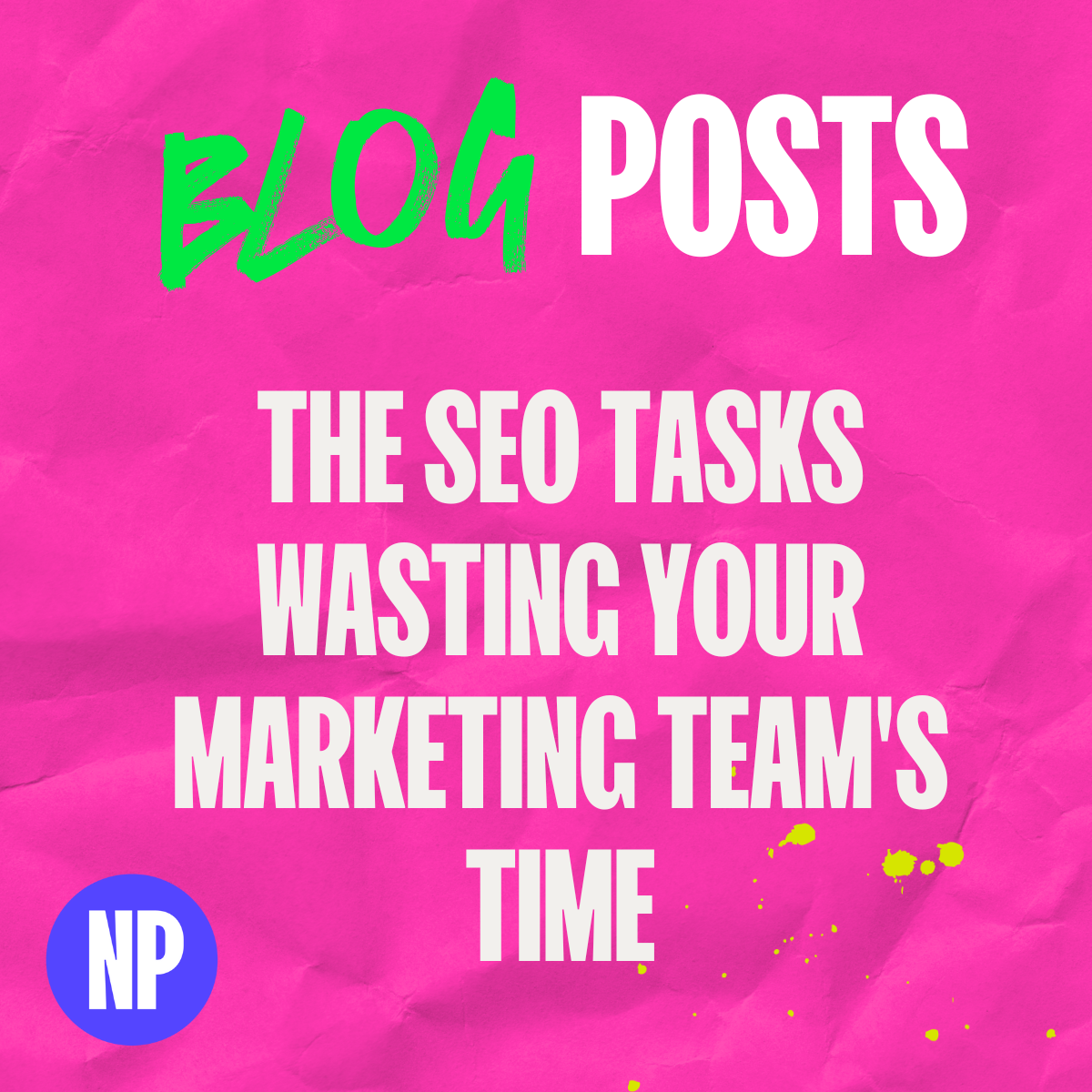Your marketing manager is drowning in SEO tasks.
They’re publishing blog posts every week. Checking rankings daily. Tweaking meta descriptions. Following every algorithm update. Researching keywords. Fixing technical issues they don’t understand. And responding to every “SEO tip” they see on LinkedIn.
Meanwhile, your actual marketing strategy – the stuff that builds relationships and brings in clients – is getting neglected.
Let’s face it, most SEO advice is written for SEO professionals, agencies, or businesses where SEO is the entire marketing strategy. It’s not usually written for B2B service businesses where SEO should support your marketing, not consume it.
Your marketing team is too valuable to spend 15 hours a week on SEO busywork that makes no difference to your bottom line.
Your marketing team should focus on strategy and client relationships, not technical SEO tasks.
I take the technical work off their plate so they can do what they’re good at. Book a call and I’ll show you what they should stop doing immediately.
Let’s take a look at some of the tasks your marketing people are struggling with, and later on I’ll tell you how you can help them to get more out of their SEO efforts.

The weekly blog post treadmill nobody asked for
Someone, somewhere, told you that blogging regularly is essential for SEO. So your marketing manager spends 6-8 hours every week researching, writing, editing, and publishing blog posts.
Except nobody’s reading them. They’re not ranking. And they’ve brought in exactly zero enquiries in the last six months.
But you keep doing it because “consistency matters” and “Google rewards fresh content.”
I worked with a B2B consultancy whose marketing manager was publishing three blog posts weekly. Every single week. For two years.
The posts got minimal traffic. No enquiries. No business impact whatsoever.
We stopped the blog treadmill completely. Instead, we spent those 20+ hours per month on two things: optimising their existing service pages to match what buyers were really searching for, and creating one quarterly blog post that targeted people ready to hire someone.
Within four months, enquiries from organic search had tripled. Not because they were publishing more – because they were finally matching search intent properly.
Frequency doesn’t matter if you’re answering questions nobody’s asking. One post per quarter that serves buyer intent will bring in more business than fifty posts about industry trends.
If your marketing team is spending hours every week on blog posts that bring in nothing, stop. Immediately.

Daily ranking checks and constant tweaking
Daily ranking checks are crack cocaine for marketing managers.
They log into SE Ranking, SEMrush, or Ahrefs every morning, watch the little numbers go up and down, and panic when position 7 becomes position 9.
Then they spend the rest of the day tweaking. Meta descriptions. H1 tags. Internal links. Reading about algorithm updates and SERP volatility. Adjusting strategy based on LinkedIn hot takes.
Meanwhile, your real business metrics – enquiries, conversions, revenue from organic search – stay flat.
Rankings feel like progress. Tweaking feels productive. But unless you’re showing up for searches from people ready to buy, none of it matters.
I see marketing teams celebrating because they’ve moved from position 15 to position 8 for some generic industry term that brings in zero qualified traffic. Or spending hours rewriting meta descriptions from 165 characters to 160 because someone on SEO Twitter (never X) said it matters.
It doesn’t.
Your marketing manager shouldn’t be checking rankings daily. They should be checking enquiries. (Probably not daily, because that way madness lies, but definitely more frequently than rankings.)
If rankings are going up but enquiries aren’t, you’re not matching what buyers are actually looking for.

Technical SEO tasks they don’t understand
Your marketing boffin is probably brilliant at marketing (you wouldn’t have hired them if they weren’t, right?). They understand messaging, positioning, audience research, content strategy.
They don’t understand canonical tags, schema markup, robots.txt files, or redirect chains.
But someone told them these things matter for SEO, so they’re trying to learn.
They’re watching YouTube tutorials about technical SEO. Reading articles about structured data. Listening to podcasts about 301 redirects and how to avoid redirect loops.. Attempting to fix things they don’t have the background to properly understand.
And they’re getting it wrong. Technical SEO requires technical knowledge.
I worked with a marketing team who’d spent three months trying to fix their site speed issues. They’d watched tutorials, read articles, tried various plugins. Nothing worked.
When I looked at their site, the problems were immediately obvious to someone with technical SEO experience – but completely out of scope to a marketing generalist.
I fixed everything (with the help of their web developer) in two weeks. The marketing team went back to doing marketing.
Your marketing manager’s time is too valuable for them to spend it learning technical skills they’ll use once and then forget. Technical SEO should be handled by someone who does it every day.

What they should be doing instead
If your marketing bod isn’t spending hours on SEO busywork, what should they be doing?
- Understanding your customers properly. What problems are they trying to solve? What are they searching for when they’re ready to buy? What objections stop them from contacting you?
- Creating content that matches buyer intent. Not blog posts about industry trends – content that answers the questions your buyers ask when they’re evaluating providers.
- Improving your conversion path. Once someone lands on your website, what stops them from contacting you? Is your messaging clear? Is your contact form easy to use?
- Building relationships with referral sources. Networking with complementary businesses. Following up with past clients.
All of these activities drive business results. None of them require your marketing team to become technical SEO experts.

B2B SEO – the 80/20 rule
What matters for most B2B service businesses:
Understanding search intent.
They should be working out whether people are looking for information, comparing providers, or ready to buy – and making sure your content serves what they’re trying to accomplish. This is the single biggest factor in whether your SEO brings in business.
Clear, comprehensive service pages
Pages that explain what you do, who you help, and why someone should choose you. Written to match what people are actually searching for when they’re evaluating providers.
Fixing obvious technical problems
Issues that stop Google from crawling and indexing your site properly. But this is a one-time fix, not ongoing busywork.
Making it easy to convert
Clear calls-to-action, simple contact forms, visible phone numbers.
That’s it. That’s 80% of what drives results for B2B SEO.
Everything else – the daily ranking checks, the constant tweaking, the algorithm update panic, the weekly blog posts about industry news – is mostly noise.

The real cost of DIY SEO
Your marketing team can handle some SEO tasks. Understanding what your customers are searching for. Writing service page content. Creating content strategy.
But technical SEO? Ongoing optimisation? Strategic decisions about what to prioritise?
These tasks require specialist knowledge your marketing team probably doesn’t have and shouldn’t waste time acquiring.
A marketing manager probably costs £40-80K in salary, plus benefits, plus tools. If they’re spending 15-20 hours weekly on SEO tasks they’re not qualified for, you’re paying premium rates for mediocre results.
You could pay someone who knows what they’re doing and get better results whilst freeing up your marketing team to do what they’re good at.
I’m not saying this because I want your business (though obviously I do). I’m saying it because I’ve seen too many talented marketing managers burning out trying to do everything, and doing none of it particularly well.

When to get SEO help
If your marketing people are spending more than 5 hours per week on SEO and you’re not seeing consistent enquiries from organic search, something’s wrong.
Either they’re working on the wrong things, they’re not matching search intent properly, or they’re trying to do specialist work they don’t have the background for.
The solution isn’t to send them on an SEO course or buy them more tools. The solution is to get the technical and strategic SEO work off their plate so they can focus on marketing activities that play to their strengths.
If your marketing team is spending hours on SEO that doesn’t bring in clients, let’s talk about what they should be doing instead.




